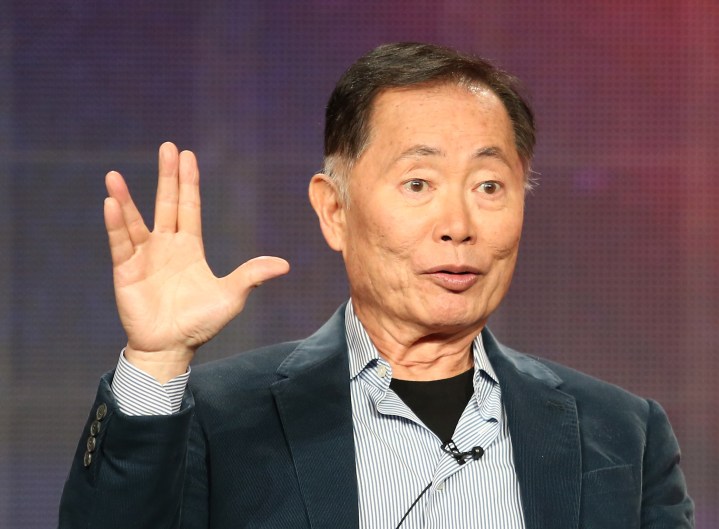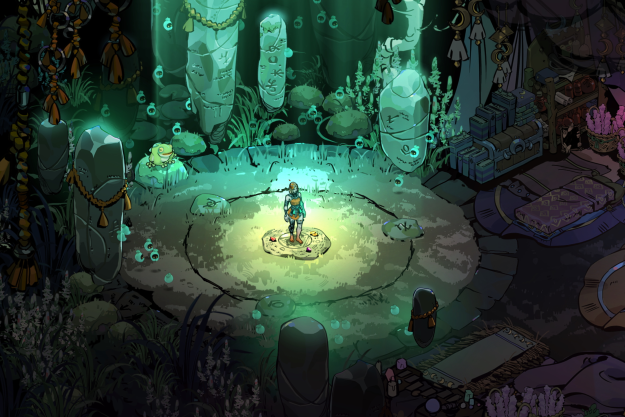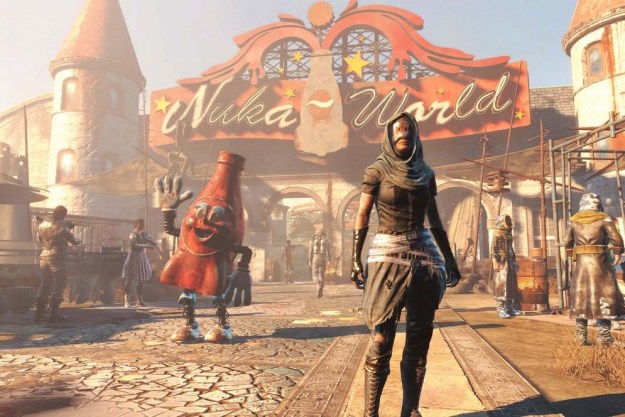
George Takei claims to live a pretty low-tech life (“I know nothing about tech,” he confesses to Digital Tends), but that doesn’t stop the Hollywood legend from being surrounded by game-changing technology.
Whether it’s manning the console as Hikaru Sulu, the helmsman of the USS Enterprise, in Star Trek: The Original Series, or his latest role, voice acting in Sega’s upcoming video game, Yakuza: Like A Dragon, the sci-fi icon is a magnet for boundary-pushing tech.
Swapping the stars for the streets, the upcoming RPG sees him play the role of Masumi Arakawa, a powerful patriarch whose dissolution of a yakuza empire sets into motion the conflict at the heart of the highly anticipated game’s winding narrative. It’s the latest in the critically acclaimed Japanese gangland adventure series, Yakuza.
When Digital Trends sat down with Takei ahead of Yakuza: Like A Dragon’s upcoming release, we were surprised to learn that although the game is high-spec — it’s coming to current-gen consoles in November and serving as a launch title for the Xbox Series X — the recording process for it was surprisingly rustic (his showbiz secret is, erm, blankets). Read on for the exclusive interview as Takei reveals all about the Yakuza recording process, social media stardom, and his potential plans to head to space in real life.

Digital Trends: How did you get involved with Sega and Yakuza: Like A Dragon? Were you a fan?
George Takei: Full disclosure, I am an actor. We tell stories with television series, with feature films, in the theater, and in games — but I know nothing about games themselves, and I’m not a techie. I can turn on the computer and send emails, and that’s it. But I love acting, and they asked me to act in this game, and it’s a wonderful story. And so, I am excited to be telling the story of Masumi Arakawa in Yakuza: Like A Dragon.
How has your experience of voice acting changed over the years?
GT: Well, I grew up on voice acting. I am of the radio generation, and the nature of voice acting really hasn’t changed much over the years. Whether it’s a feature film or a TV series, or game: Storytelling is storytelling. My first paying gig, back in 1958, was voice acting. Can you imagine? It was more than 60 years ago!
What was involved in that first experience of voice-over recording?
GT: It was for a Japanese sci-fi film, about a prehistoric monster that is released by atomic radiation and terrorizes Tokyo and Osaka. It was at MGM studios, which was an awe-inspiring experience. To walk through that studio gate ,and walk into that huge soundstage, and see all these other actors who were grizzled veterans was thrilling. The producers decided to import this Japanese film and dub in English dialogue, and so my job was to dub in the English on actors speaking in Japanese. Sometimes the translation was longer than the lip movements, and so we had to get a good lung full of air and speak that line very fast and try to match the lip movement, or if it was very short, we had to fill the time with a lot of hmms and ahs.
Are there lessons you learned from that which you still use now?
GT: That was a fascinating way of working, and it’s still the same thing with Yakuza, except for it’s very realistically drawn animation. Animation lip syncing is easier. Those were movies of real actors and a close-up lip movement is very visible there, so you had to match that movement, whereas with Yakuza, it’s very realistic, glossy animation, so we didn’t have to match the precise closing and opening of the lips and teeth.
How does the tech in the recording booth now compare to what you used then?
GT: My home is my recording studio, now that we’re in a pandemic, and we’re not gathering to work in a soundstage. I do voice-overs from here with my computer screen and Zoom, and they have mics that they send over. Then we have cushions piled up high, and hang blankets all over the place for sound-absorbing. I’m just glad that I don’t have to drive on the freeway to get anywhere!
Special and practical effects have clearly come so far in the projects we’ve seen you in … but have they ever gone wrong for you?
GT: I’ve never had an effects failure, but weather has been a big nemesis. For the Vietnam war film The Green Berets, we were shooting on location at a military base in Columbus, Georgia. We had a thunderstorm hit us. It drenched everything, and the rain wouldn’t stop. We had started shooting an important scene in blazing Southern sunlight, and so we stopped and had to wait for the sun to return. Four days passed and still no sun. They decided to change the scene to a rain scene, because it rains a lot in Vietnam too. We started filming in the rain, and filmed for about three days, and then the rain stopped. No more rain. But now everything was muddy, and we’d been filming in wet uniforms; our hair lank with rain. By then, we’d done so much filming in the rain that we had to replicate it. So in blazing sunshine, they muddied down the set, and stage hands had to douse us with buckets of water the whole time. We went way over schedule. So we had a Mother Nature fail, but not an effects fail.
What technology had the biggest influence on you growing up?
GT: I grew up imprisoned in an American concentration camp, where we had no technology. After the Japanese bombed Pearl Harbor, we Americans of Japanese ancestry were looked at with fear and outright hatred, simply because we look like this. I was born in Los Angeles, yet I was considered an enemy, with no basis in fact. We were rounded up and taken away from our homes to a concentration camp in Arkansas, where I lived in until I was 8. We had nothing there, not even radio. So when the Second World War ended and we were released, the radio was an amazing discovery for me. For the first time, I could hear stories. When I listened to The Cisco Kid, I could be in the Southwest, and when I heard The Green Hornet, I was in Manhattan. These sounds — an actor talking or laughing or shouting — transported me to another place.
You’re very active on social media, and use your platform to support charities and humanitarian causes. Why is it important to use digital means like social media and the internet to raise awareness of these kind of issues?
GT: I have a very powerful social presence, with over 13 million people following me, and I advocate for many causes using it. It’s powerful. And even though I’m not a gamer and know nothing about it, gaming is important too. It’s storytelling, and storytelling is a powerful way to move people, and perhaps change their thinking and attitudes and values. That’s what my life has been about — to raise the awareness of a lot of social issues, and to campaign for that redress for the unjust imprisonment of Japanese Americans.

Which piece of tech from Star Trek would you like to see invented in real life first?
GT: The transporter. I travel a lot, when we’re not in this quarantine situation, and I want to be able to arrive at my destination instantly. No airports, no plane flight delays, no security checks, nothing — just step on a pad, sparkle, and pop out.
Which real-life tech is particularly exciting to you?
GT: Well, just the other day, two American astronauts came back from the International Space Station, and splash-landed in the Gulf of Mexico, and it was all done in the private sector, thanks to Elon Musk’s SpaceX. We are moving forward, while at the same time ,there’s chaos here on Earth. They’re developing space tourism now, too. That is our new frontier.
Are you following the rise of space tourism?
GT: Well, I’m 83, so it may not happen in my lifetime. But as the Vulcan greeting from Star Trek says, “Live long and prosper.” Star Trek has lived so much longer than we expected it to, and prospered in so many ways. Now, one prosperity that I have in my life is my grandmother, who loved birthdays. And even though she lied about her age to sound older, she genuinely celebrated 104 birthdays. Now, I have her genes in me, and her grandson is very competitive. I intend to beat my grandmother! So, who knows, I may get to take that tourist ride to space. Elon Musk has said he wants to be buried on Mars, but I don’t think I want to be buried there. For that, I’ll stick with terra firma, right here.
Would you go on the space tourism trip if you got an invite?
GT: Oh, absolutely. I don’t know if I can afford it. If they want to invite me, though, because of my Star Trek background and that celebrity sparkle, then I would enthusiastically go — more than happily.
Yakuza: Like A Dragon’ will be released on November 13 2020 for Xbox One, PlayStation 4 and PC.




